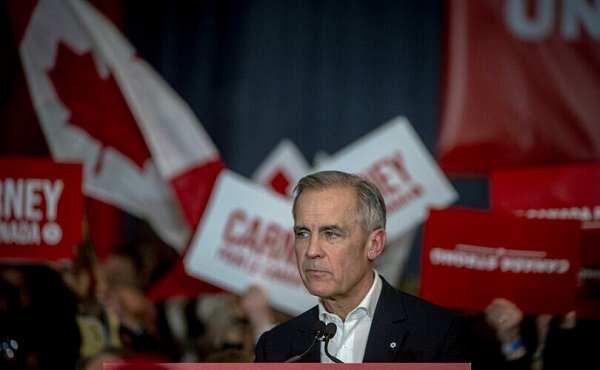Uncategorized
UK Parliament gets new chance to offer options on Brexit

LONDON — Britain’s Parliament gets another chance Monday to offer a way forward on Britain’s stalled divorce from the European Union, holding a series of votes on Brexit alternatives in an attempt to find the elusive idea that can command a majority.
With just 12 days until the U.K. must come up with a new plan or crash out of the bloc, the House of Commons was considering a variety of alternatives to Prime Minister Theresa May’s unpopular Brexit deal. Two ideas — staying in the EU customs union or holding a second referendum on Brexit — have emerged as the most likely plans to succeed.
May has ruled out both those ideas. But the divorce deal she negotiated with the EU has been rejected by Parliament three times, leaving Britain less than two weeks from a no-deal Brexit that could cause turmoil for people and businesses on both sides of the Channel.
The chief executive of industrial manufacturer Siemens U.K. implored British lawmakers to unite around a compromise Brexit deal, saying the country’s political chaos was making the U.K. a “laughing stock.”
Juergen Maier urged lawmakers to keep Britain in a customs union with the EU, saying that would allow frictionless trade to continue. In a letter published by the Politico
May’s spokesman, James Slack, said the prime minister understood that “business wants certainty,” and urged lawmakers to support May’s thrice-rejected Brexit deal.
May could try to bring her Brexit agreement back for a fourth time later this week. Slack said the prime minister “believes there is a majority in the House for leaving in an orderly way with a deal,” and her agreement was the best on offer.
Slack rejected speculation that the government could take drastic action, such as asking Queen Elizabeth II to suspend Parliament or getting her to refuse to sign legislation.
“We don’t have any intention of involving the queen,” he said.
Monday’s votes in Parliament follow an earlier round last week in which none of the eight Brexit options on offer secured a majority.
Staying in the EU customs union or holding a new Brexit referendum were on the table Monday, along with other “soft Brexit” alternatives and a call for a no-deal Brexit in which Britain leaves the EU without a deal on April 12.
The range of choices, and lack of consensus, reflect a Parliament and a government deeply divided over how — and whether — to leave the EU.
Justice Secretary David Gauke said leaving the bloc without a deal was “not the responsible thing for a government to do.”
But his Cabinet colleague Liz Truss said it would be better than a soft Brexit.
“I think that we are well prepared for no deal,” Truss, who is chief secretary to the Treasury, told the BBC. “I don’t have any fear of no deal.”
The divisions within May’s government over what to do next have left many Britons exasperated — including Conservative Party lawmakers.
Chief Whip Julian Smith, whose job is to ensure that Conservative legislators vote for government-backed policies, called the public Cabinet squabbling “the “worst example of ill-discipline in British political history.”
May has less than two weeks to bridge the hostile divide that separates those in her government who want to sever links with the EU and those who want to keep the ties that have bound Britain to the bloc for almost 50 years.
EU leaders will hold a special summit on April 10 to consider any request from Britain for a longer delay to Brexit — or to make last-minute preparations for Britain’s departure without a deal two days later.
European Commission chief Jean-Claude Juncker said Monday that it was time for the British Parliament to spell out what it wanted on Brexit.
“A sphinx is an open book in direct comparison with the British Parliament,” he told the Saarland state legislature in Saarbruecken, Germany. “We must get the sphinx to talk now. Enough of the long silence.”
___
Geir Moulson in Berlin contributed to this story.
___
Follow AP’s full coverage of Brexit at: https://www.apnews.com/Brexit
Danica Kirka And Jill Lawless, The Associated Press
Uncategorized
Poilievre on 2025 Election Interference – Carney sill hasn’t fired Liberal MP in Chinese election interference scandal

From Conservative Party Communications
“Yes. He must be disqualified. I find it incredible that Mark Carney would allow someone to run for his party that called for a Canadian citizen to be handed over to a foreign government on a bounty, a foreign government that would almost certainly execute that Canadian citizen.
“Think about that for a second. We have a Liberal MP saying that a Canadian citizen should be handed over to a foreign dictatorship to get a bounty so that that citizen could be murdered. And Mark Carney says he should stay on as a candidate. What does that say about whether Mark Carney would protect Canadians?
“Mark Carney is deeply conflicted. Just in November, he went to Beijing and secured a quarter-billion-dollar loan for his company from a state-owned Chinese bank. He’s deeply compromised, and he will never stand up for Canada against any foreign regime. It is another reason why Mr. Carney must show us all his assets, all the money he owes, all the money that his companies owe to foreign hostile regimes. And this story might not be entirely the story of the bounty, and a Liberal MP calling for a Canadian to be handed over for execution to a foreign government might not be something that the everyday Canadian can relate to because it’s so outrageous. But I ask you this, if Mark Carney would allow his Liberal MP to make a comment like this, when would he ever protect Canada or Canadians against foreign hostility?
“He has never put Canada first, and that’s why we cannot have a fourth Liberal term. After the Lost Liberal Decade, our country is a playground for foreign interference. Our economy is weaker than ever before. Our people more divided. We need a change to put Canada first with a new government that will stand up for the security and economy of our citizens and take back control of our destiny. Let’s bring it home.”
Uncategorized
Canada Needs A Real Plan To Compete Globally

From the Frontier Centre for Public Policy
Ottawa’s ideological policies have left Canada vulnerable. Strategic action is needed now
As Canada navigates an increasingly complex geopolitical landscape, the next federal government must move beyond reflexive anti—Americanism regardless of its political leanings. Instead, Canada should prioritize national interests while avoiding unnecessary conflict and subservience.
The notion that Canada can stand alone is as misguided as the idea that it is only an economic appendage of the United States. Both perspectives have influenced policy in Ottawa at different times, leading to mistakes.
Rather than engaging in futile name-calling or trade disputes, Canada must take strategic steps to reinforce its autonomy. This approach requires a pragmatic view rooted in Realpolitik—recognizing global realities, mitigating risks, governing for the whole country, and seizing opportunities while abandoning failed ideologies.
However, if Washington continues to pursue protectionist measures, Canada must find effective ways to counteract the weakened position Ottawa has placed the country in over the past decade.
One key strategy is diversifying trade relationships, notably by expanding economic ties with emerging markets such as India and Southeast Asia. This will require repairing Canada’s strained relationship with India and regaining political respect in China.
Unlike past Liberal trade missions, which often prioritized ideological talking points over substance, Canada must negotiate deals that protect domestic industries rather than turning summits into platforms for moral posturing.
A more effective approach would be strengthening partnerships with countries that value Canadian resources instead of vilifying them under misguided environmental policies. Expand LNG exports to Europe and Asia and leverage Canada’s critical minerals sector to establish reciprocal supply chains with non-Western economies, reducing economic reliance on the U.S.
Decades of complacency have left Canada vulnerable to American influence over its resource sector. Foreign-funded environmental groups have weakened domestic energy production, handing U.S. industries a strategic advantage. Ottawa must counter this by ensuring Canadian energy is developed at home rather than allowing suppressed domestic production to benefit foreign competitors.
Likewise, a robust industrial policy—prioritizing mining, manufacturing, and agricultural resilience—could reduce dependence on U.S. and Chinese imports. This does not mean adopting European-style subsidies but rather eliminating excessive regulations that make Canadian businesses uncompetitive, including costly domestic carbon tariffs.
Another key vulnerability is Canada’s growing military dependence on the U.S. through NORAD and NATO. While alliances are essential, decades of underfunding and neglect have turned the Canadian Armed Forces into little more than a symbolic force. Canada must learn self-reliance and commit to serious investment in defence.
Increasing defence spending—not to meet NATO targets but to build deterrence—is essential. Ottawa must reform its outdated procurement processes and develop a domestic defence manufacturing base, reducing reliance on foreign arms deals.
Canada’s vast Arctic is also at risk. Without continued investment in northern sovereignty, Ottawa may find itself locked out of its own backyard by more assertive global powers.
For too long, Canada has relied on an economic model that prioritizes federal redistribution over wealth creation and productivity. A competitive tax regime—one that attracts investment instead of punishing success—is essential.
A capital gains tax hike might satisfy activists in Toronto, but it does little to attract investments and encourage economic growth. Likewise, Ottawa must abandon ideological green policies that threaten agri-food production, whether by overregulating farmers or ranchers. At the same time, it must address inefficiencies in supply management once and for all. Canada must be able to feed a growing world without unnecessary bureaucratic obstacles.
Ottawa must also create an environment where businesses can innovate and grow without excessive regulatory burdens. This includes eliminating interprovincial trade barriers that stifle commerce.
Similarly, Canada’s tech sector, long hindered by predatory regulations, should be freed from excessive government interference. Instead of suffocating innovation with compliance mandates, Ottawa should focus on deregulation while implementing stronger security measures for foreign tech firms operating in Canada.
Perhaps Ottawa’s greatest mistake is its knee-jerk reactions to American policies, made without a coherent long-term strategy. Performative trade disputes with Washington and symbolic grandstanding in multilateral organizations do little to advance Canada’s interests.
Instead of reacting emotionally, Canada must take proactive steps to secure its economic, resource, and defence future. That is the role of a responsible government.
History’s best strategists understood that one should never fight an opponent’s war but instead dictate the terms of engagement. Canada’s future does not depend on reacting to Washington’s policies—these are calculated strategies, not whims. Instead, Canada’s success will be determined by its ability to act in the interests of citizens in all regions of the country, and seeing the world as it is rather than how ideological narratives wish it to be.
Marco Navarro-Génie is the vice president of research at the Frontier Centre for Public Policy. With Barry Cooper, he is co-author of Canada’s COVID: The Story of a Pandemic Moral Panic (2023).
-

 John Stossel1 day ago
John Stossel1 day agoGovernment Gambling Hypocrisy: Bad Odds and No Competition
-

 2025 Federal Election2 days ago
2025 Federal Election2 days agoMark Carney pledges another $150 million for CBC ahead of federal election
-

 Alberta1 day ago
Alberta1 day agoAlberta’s embrace of activity-based funding is great news for patients
-

 2025 Federal Election1 day ago
2025 Federal Election1 day agoCommunist China helped boost Mark Carney’s image on social media, election watchdog reports
-

 2025 Federal Election2 days ago
2025 Federal Election2 days agoMark Carney’s radical left-wing, globalist record proves he is Justin Trudeau 2.0
-

 2025 Federal Election1 day ago
2025 Federal Election1 day agoFifty Shades of Mark Carney
-

 2025 Federal Election2 days ago
2025 Federal Election2 days agoDoes Canada Need a DOGE?
-

 2025 Federal Election2 days ago
2025 Federal Election2 days agoI don’t believe these polls!









